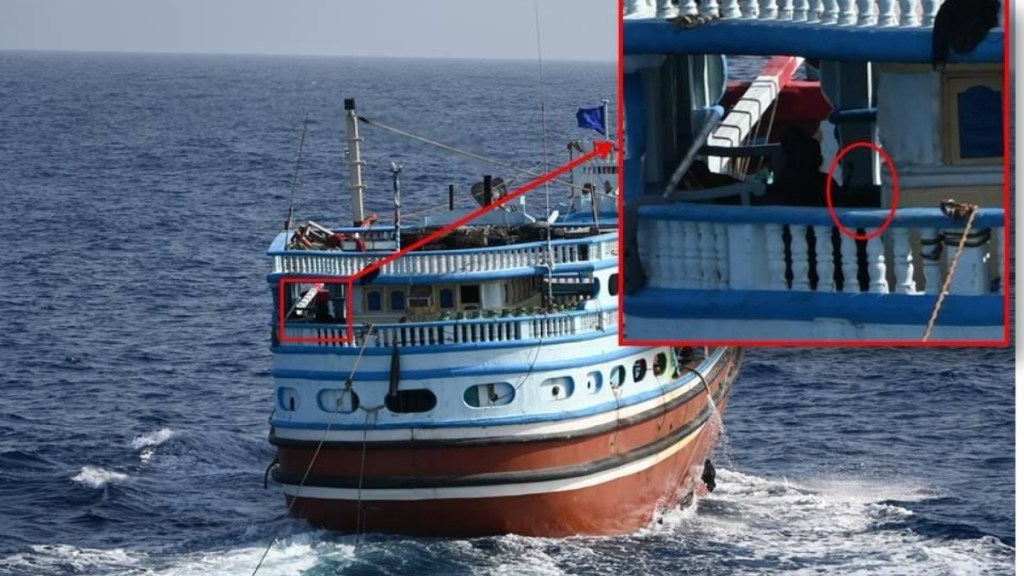In yet another display of maritime prowess, the Indian Navy recently undertook a daring rescue operation in the Arabian Sea, successfully liberating 23 Pakistani crew members from the clutches of piracy.
The harrowing ordeal began when an Iranian Fishing Vessel (FV) ‘Al Kambar 786’ fell victim to a hijacking by ruthless pirates. Swift to respond, the Indian Navy dispatched two of its vessels, INS Sumedha and INS Trishul, both skillfully trained in maritime security operations, to confront the looming threat.
News of the potential piracy incident reached Indian naval authorities late in the evening of March 28, 2024, prompting an immediate redirection of resources towards intercepting the hijacked vessel. With precision and determination, the Indian Navy ships closed in on the ‘Al Kambar 786,’ strategically positioned approximately 90 nautical miles southwest of Socotra, where nine armed pirates had seized control of the vessel.
Throughout the ensuing hours, a relentless standoff ensued as INS Sumedha and INS Trishul employed a series of coercive tactical maneuvers to pressure the pirates into surrender. The Indian Navy’s specialized teams demonstrated remarkable skill and professionalism, ultimately forcing the perpetrators to relinquish their hold on the hijacked vessel. Following the successful rescue operation, Indian naval personnel swiftly commenced thorough sanitization and seaworthiness checks on the ‘Al Kambar 786,’ ensuring its readiness to resume normal fishing activities.

This heroic intervention by the Indian Navy highlights its unwavering commitment to safeguarding maritime security in the region and protecting the lives of seafarers, regardless of their nationalities. The operation not only thwarted a grave threat but also sent a clear message of deterrence to would-be pirates operating in the Arabian Sea.
However, beyond the immediate success of the rescue operation lies a broader concern: the persistent threat of piracy in the region. Analysts warn of the volatile security situation in the Red Sea, intensified by attacks from Yemen-based Houthi rebels on commercial shipping, which could potentially embolden Somali pirates in the nearby Horn of Africa. The consequences of such piracy activities extend far beyond the waters they plague, posing a significant risk to global maritime trade and the stability of the international economy.
Recent incidents, such as the hijacking of the MV Ruen by Somali pirates in December, serve as stark reminders of the ongoing challenges faced by maritime nations. The Indian Navy’s swift response to intercept the hijacked vessel and neutralize the pirate threat underscores its formidable capabilities in anti-piracy operations. The involvement of advanced technologies, including long-endurance drones such as the MQ-9B SeaGuardian, indigenous Maritime Spotter Drones, by Sagar Defence Engineering, demonstrates India’s proactive approach to combating maritime threats.
Furthermore, the commendable efforts of India’s elite marine commando force, MARCOS, in executing complex rescue missions reflect years of rigorous training and dedication to excellence. Modeled after elite Special Forces units like Britain’s SAS, MARCOS operatives undergo rigorous selection and training processes, ensuring a highly skilled and capable force ready to confront maritime threats head-on.
In recognition of their valiant efforts, the Indian Navy has received accolades from international partners, including the President of Bulgaria, who expressed gratitude for the successful rescue of the hijacked vessel and its crew. This collective response underscores the importance of international cooperation in addressing maritime security challenges and upholding the rule of law on the high seas.


